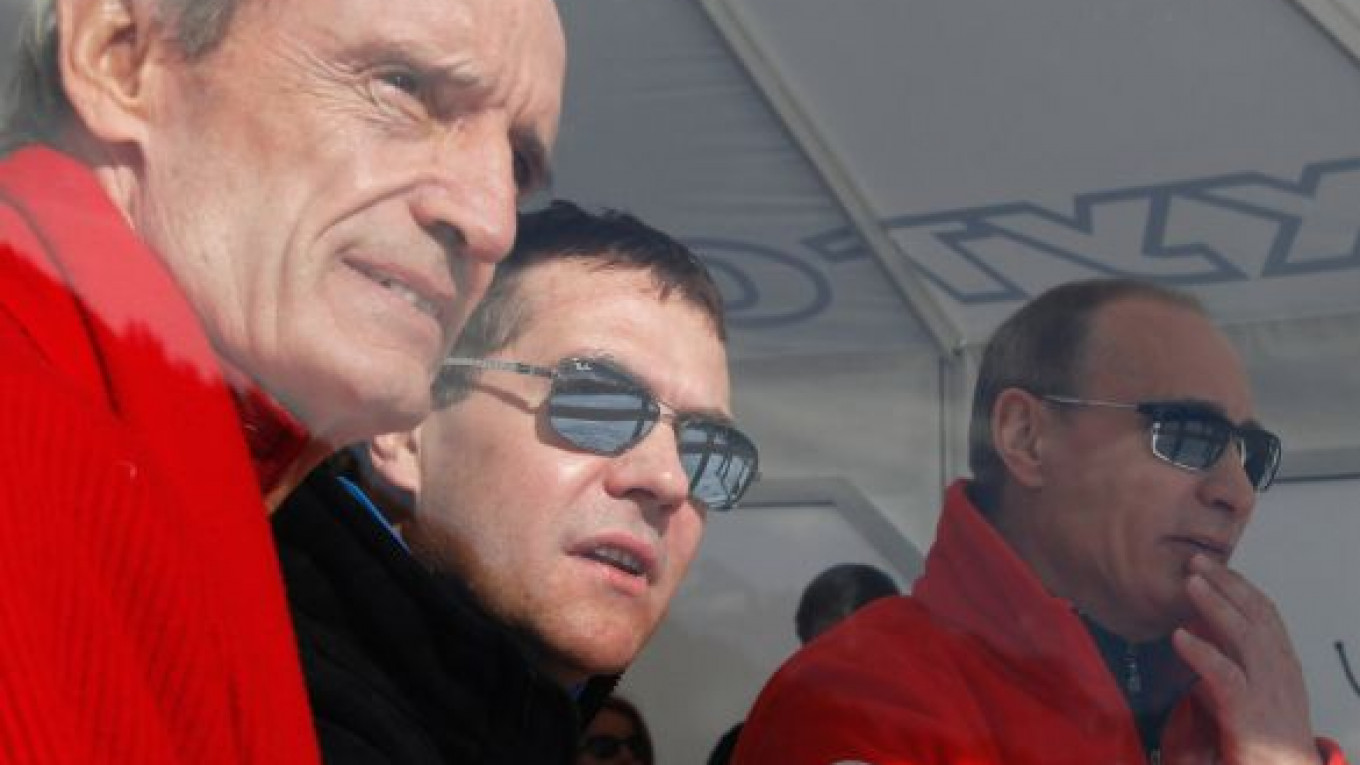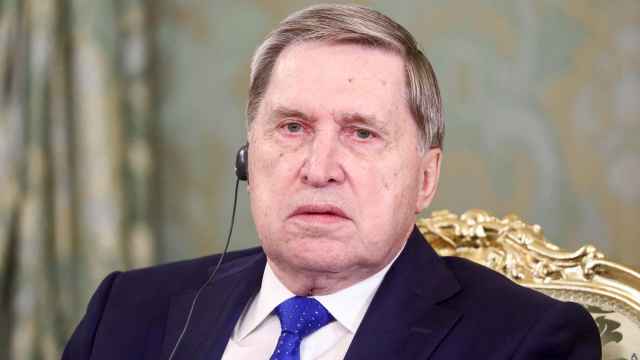LONDON — As the IOC's point man for the 2014 Winter Olympics in Sochi, French ski great Jean-Claude Killy knows exactly where to turn when he needs a helping hand.
Just call Vladimir Putin.
"I tell him my worries and, most of the time, in the next two or three hours, what I am asking is done," Killy said. "Very, very impressive."
That's what you get when Russia's most powerful man is also the driving force behind the Sochi Games, a multibillion-dollar project to turn the Black Sea resort into a winter sports Mecca and year-round tourist destination.
"He's truly the captain," Sochi organizing committee chief Dmitry Chernyshenko said. "He was and he will always be."
As London puts the final touches on preparations for this year's Summer Olympics — just over six months away — Sochi is plowing ahead with the giant task of getting ready for its moment on the world stage two years from now.
It's no exaggeration to say Russia was awarded the games because of Putin. In 2007, he traveled all the way to Guatemala City, swept IOC members off their feet and spoke in English at the final presentation to secure the Olympics for Sochi in a three-city vote.
Since then, Putin — both as president and prime minister — has remained a pivotal figure in the massive effort. Most of the venues and facilities are being built from scratch in the seafront town at the base of the Caucasus mountain range.
Despite some construction delays, Sochi organizers and the International Olympic Committee say preparations are firmly on track for Russia's first Winter Games.
Killy, who won three gold medals at the 1968 Grenoble Games, chairs the IOC coordination commission for Sochi and meets regularly with Putin during his travels to Russia.
"He loves the project," Killy said by telephone. "The project is totally linked to what they call 'New Russia,' which is a new beginning, a new image, new opening to the world."
"Mr. Putin is in the front line. He just loves it."
Political Ups and Downs
Suddenly, however, Putin finds himself in a new and unaccustomed position — the target of the biggest anti-government demonstrations Russia has seen in two decades.
Tens of thousands of Russians took part in protests in December to express their outrage after the Dec. 4 parliamentary elections that observers said was rigged to boost the results for Putin's United Russia party.
Putin, now prime minister, is bidding to extend his 12-year rule by reclaiming the more-powerful presidency in the election on March 4.
So, what does this all mean for the Sochi Olympics?
Killy, who last met with Putin and Medvedev in late November, was cautious in discussing the new political landscape, stressing that he must remain "totally neutral." But he made clear that he's not concerned about the potential impact on the Olympics.
"Our only task is to deliver the games," Killy said. "Everything is going according to plan and according to promises. I have no reason to worry at this time."
"I've had three years of [Putin] as president and 2 1/2 years of him as prime minister," he added. "He has the power. His political position is the No. 1 factor. His love for sport is No. 2."
In addition to Putin and Medvedev, Deputy Prime Ministers Alexander Zhukov and Dmitry Kozak have been deeply involved with the Sochi project and worked closely with Killy.
For Russia's leaders, the Olympics are a matter of national pride and prestige. No matter the current political situation, the IOC is confident they will stay that way.
"They refuse to think of not doing it perfectly," Killy said. "It is not an option."
With Olympic hosts chosen seven years in advance, there is always the chance of political upheavals and changes in government in the host cities and countries. It's something the IOC and Killy are perfectly used to.
"We have had changes in almost all of our last Olympics," he said. "We adjust. Delivering the Olympic Games is the responsibility of the country and of a city. We now have a fourth mayor in Sochi. We keep pushing and we must succeed."
Dick Pound, who has been an IOC member since 1978 and witnessed the ups and downs of many Olympic organizing committees, also sees no danger to the Sochi Games. There is simply too much at stake for the host country.
"Russia, the federation, is so engaged in this, it cannot fail," Pound said. "It's like the military saying: 'It's a no-fail mission.' There's just no alternative. I think they'll get it done."
"To be fair, the Russia today is not the Soviet Union of 1980. You've got to take politicians as they come, but you hope there aren't any tanks in the streets."
Security is an issue for Sochi. It is located about 1,300 kilometers south of Moscow near the restive North Caucasus, which has been plagued by violent confrontations between Islamist militants and law enforcement agencies. It is also adjacent to Abkhazia, a region that broke free of Georgian control in the early 1990s and was recognized by Moscow as independent after the 2008 war between Russia and Georgia.
Biggest Construction Site
No matter who is running Russia, getting Sochi ready for the games remains a huge task, with the ice arenas and athletes' village being built in the subtropical city and snow and sliding venues in the nearby mountains — as well as roads, rail lines and tunnels to connect the clusters.
According to the latest report by Russian auditors, the total cost of the project stood at a whopping $41.6 billion as of October 2011.
About 55,000 workers have been toiling around the clock, seven days a week, in what is Europe's biggest construction project.
"We have never had to face such a gigantic challenge," Killy said.
Kozak, the deputy prime minister, acknowledged last week that more than 70 out of 400 construction projects are behind schedule, but said the delays are "related to paperwork" and do not threaten the games.
"We are not worrying about this," IOC President Jacques Rogge said in Innsbruck, Austria, where he is attending the Winter Youth Olympics. "We are sure that the games will be held in a peaceful environment and good conditions."
Killy cited two venues that are slightly behind schedule — ski jumping and the bobsled and luge track.
Chernyshenko said installation of the cooling system for the track will start this month and, "fingers crossed," the venue will be complete in February. Work will be speeded up on the landing area of the ski jump, which should be ready for a Nordic combined test event in July, he said.
Killy will return to Sochi next month for his commission's latest inspection visit, coinciding with women's World Cup ski races serving as official test events for the games.
Chances are that Putin will turn up, just as he did a year ago when the first domestic ski races were held on the Olympic course.
Chernyshenko would be more than happy to welcome the captain back.
"Whatever happens, the Olympic Games in Sochi is his baby and his personal project," Chernyshenko said. "We are in no doubt that, in any capacity, he will be the leader of this project when Russia will be in the glory in 2014."
A Message from The Moscow Times:
Dear readers,
We are facing unprecedented challenges. Russia's Prosecutor General's Office has designated The Moscow Times as an "undesirable" organization, criminalizing our work and putting our staff at risk of prosecution. This follows our earlier unjust labeling as a "foreign agent."
These actions are direct attempts to silence independent journalism in Russia. The authorities claim our work "discredits the decisions of the Russian leadership." We see things differently: we strive to provide accurate, unbiased reporting on Russia.
We, the journalists of The Moscow Times, refuse to be silenced. But to continue our work, we need your help.
Your support, no matter how small, makes a world of difference. If you can, please support us monthly starting from just $2. It's quick to set up, and every contribution makes a significant impact.
By supporting The Moscow Times, you're defending open, independent journalism in the face of repression. Thank you for standing with us.
Remind me later.






